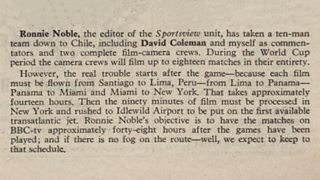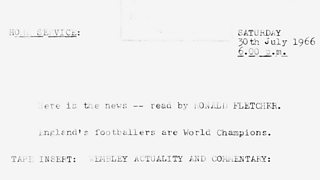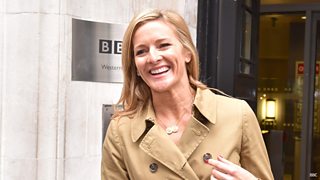
Kenneth Wolstenholme presenting coverage of West Ham United v Sheffield United in 1966
More than 20 million UK viewers tuned in to watch the final of the 2014 FIFA World Cup in Brazil. In stark contrast there is barely a trace of the early World Cups in �������� Genome's television and radio listings.
The first football World Cup was held in 1930. It was a humble affair, which didn’t get an outing on radio or TV in the UK. Scotland and England were invited but did not accept; a Radio Times article previewing the 1954 tournament suggested this was because they did not believe the opposition sides were good enough. After follow-up tournaments in 1934 and 1938, the contest was abandoned during World War Two.
The 1950 World Cup was held in Brazil and England participated for the first time. It was still a . Italy travelled to the tournament by boat, but the two-week voyage wasn’t particularly conducive to maintaining athletic fitness. Out of condition, they immediately lost their first game to Sweden and were effectively out of the tournament.
Coverage was very limited and the front page of Radio Times that week focused on tennis, with no mention of the tournament. Sporadic from games was all that was available on radio. Competing in their first World Cup, England had the nickname “Kings of Football” and were one of the favourites, having beaten Portugal 10–0 in Lisbon two weeks before the tournament. However, they were knocked out in the first round group stage, thanks to a 1-0 loss against a semi-professional US side, in one of the in the tournament's history.

Kenneth Wolstenholme's Radio Times article ahead of the 1962 World Cup
Held in Switzerland, the 1954 tournament saw television coverage on the �������� for the first time via the recently installed Eurovision network, which allowed television signals to be relayed across Europe. This only worked for tournaments held in Europe, however, and ahead of the 1962 tournament �������� reporter Kenneth Wolstenholme wrote a Radio Times article about the difficulties of broadcasting matches from Chile and the aspiration to get them to air within 48 hours of the match concluding.
Four years later, Wolstenholme and fellow commentator Brian Moore wrote a seven-page preview of the major sides before the 1966 tournament hosted in England. Later on in the edition, an article previewing the comprehensive �������� reporting of the upcoming tournament stated: “A feast of soccer on television is offered to ��������-1 viewers during the World Cup,” and promised more than 50 hours of coverage. England went on to win the tournament, with Wolstenholme providing one of the most famous moments in the history of sports broadcasting with his commentary on the final England goal.
England’s World Cup win earlier in the day dominated the news report that evening but it was a good day to bury bad news with the script showing that the second story on the �������� Service that evening was a report about the government freezing wages.

Although many people were still watching in black and white, the was the first to be broadcast on colour television and you can watch Carlos Alberto’s famous goal as Brazil beat Italy in the final here. It was also the last World Cup to feature Pele, celebrated as one of the greatest players of all time. The Brazilian features in numerous �������� Genome listings and his “extraordinary life” was the subject of a �������� Two in 2002.
Scotland have played in eight World Cups and, although they have never progressed beyond the first round, one of their greatest World Cup moments was captured in 1978 when they beat Holland with a superb goal from Archie Gemmill, described by commentator David Coleman here.
Coverage of the World Cup is on the government mandated "protected" list, meaning it must be shown on free-to-air terrestrial television. Throughout most of the competition’s history, �������� and ITV have jointly covered the tournament on UK television but the unpredictable nature of the competition means the allocation of matches happens at short notice. This can be a problem for Radio Times, which has to print the broadcasters’ alternative TV schedules for match days.
The �������� didn’t show England’s 1998 second-round match against Argentina, so instead broadcast their including Celebrity Ready, Steady, Cook and One Foot in the Grave. The football fans were more likely than Victor Meldrew to be exclaiming disbelief that night. A red card for David Beckham and a missed penalty from David Batty saw England get knocked out and a certain eight-year-old boy cry himself to sleep.
World Cup coverage in the 21st Century has seen more technological breakthroughs, with shown in high-definition for the first time, a decision Ofcom credited with giving to the sales of HD-ready TV sets. There has also been an increase in the coverage of women’s football on television; in 2007 the �������� broadcast the with Gabby Logan presenting all England games live.

Gabby Logan presented �������� coverage of the 2007 Women's World Cup
Coverage continues to evolve. The 2018 tournament sees fans able to watch in Ultra HD and virtual reality for the first time, through the �������� Sport's VR 2018 World Cup app - an even more interactive way for viewers to enjoy the euphoria or heartbreak of a penalty shoot-out. There's a lot to look forward to over the next month.
